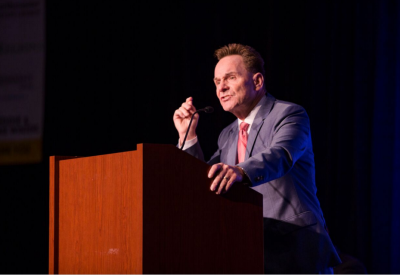Resolving Conflict in an Explosive Culture

Conflict is unavoidable. Conflict happens between husbands and wives, parents and kids, brothers and sisters, Democrats and Republicans, employees and supervisors, CEOs and boards, pastors and leaders in the church, people on social media, and a myriad of other ways.
Sadly, conflict is just one click or thoughtless response away.
In this explosive culture in America, motives are challenged endlessly. Trust in relationships is not earned easily. Criticism of others is ruthless. Cynicism is applauded loudly. Leaders are under detailed scrutiny.
With as many conflicts as we endure, one might think people really are not that concerned with it, content to live with fractured relationships and just move on. I do not believe this is the case.
People Want Conflict Resolved, but do Not Know How
A few years ago, I read that eighty-five percent of people surveyed said they wanted to resolve conflict between themselves and others. The percentage may not be this high in America any longer, but I am certain people do not like to live in conflict.
So why do people not resolve conflict? Why do they let their anger simmer into a rage, privately or publicly? I believe this occurs because they just do not know the actions to take to see it resolved.
How to Resolve Conflict in an Explosive Culture
There is no easy way to resolve conflict, but there are some actions we can take to confront it and live through it.
Be Willing to Take Responsibility
We know that people do not want to live in conflict and want to see it resolved. What we see in the media indicates that no one wants to take responsibility for conflict. However, I believe most people live a life that we do not see on television, through social media, or on the Internet.
I believe people want to see their personal conflicts resolved and are at least willing to consider taking full or partial responsibility for it.
Let me encourage you to take responsibility for conflict. It may not be easy and you may have to swallow your pride. If you are honest with yourself, do you really want to continue feeling the way you feel while living in conflict when you could resolve it and live in personal freedom? I know the answer, and I think you do as well.
While the situation or the relationship may never be the same, take responsibility for the conflict. You have to live with yourself for the rest of your life. The situation or relationship may not be life-long, but the effects of unresolved conflict can follow you.
God commends harmony and we should stop minimizing it. Stop letting the politics of today poison you. Refuse to take on the anger that others feel. This is your life to live. Refuse to live your life in conflict. Be willing to take responsibility for it.
Choose to Forgive and Let it Go
When we bear grudges, our ability to lead others down the path of forgiveness is hindered. Do you want your children and grandchildren, your colleagues in business, your brothers and sisters in Christ, to walk in the lane of unforgiveness and bitterness? Do you want this to be your legacy?
We can learn, practice, and teach what the Scripture says about forgiveness. Our offenses against God are far greater than anyone's offenses against us. Jesus Christ forgives us from all our offenses against God and we should forgive the offenses that others may have committed toward us. Let it go.
When we practice forgiveness, we can become conduits of reconciliation with and for others. Because unresolved conflict is so damaging, we as believers should be catalysts to help others.
Encourage others to take their next step and to be willing to take responsibility for conflict. Encourage them to set an appointment to deal with it, through a phone call if appropriate, or in person if needed. If things are difficult, appeal for a third person to help you resolve it.
Just resolve it. Forgive and let it go.
Resolve to Live as a Peacemaker
While America may applaud those who yell the loudest, you are not a television camera that follows the latest conflict somewhere. You are a person. You need to live as a peacemaker.
Jesus said, "The peacemakers are blessed, for they will be called sons of God" (Matthew 5:9, HCSB). Living like a peacemaker exemplifies the gospel and the gospel life so much more than condemnatory or suspicious words, or a social media rant that fans the fire of conflict.
Resolve to live as a peacemaker. This is the gospel way.
Originally posted at ronniefloyd.com




























